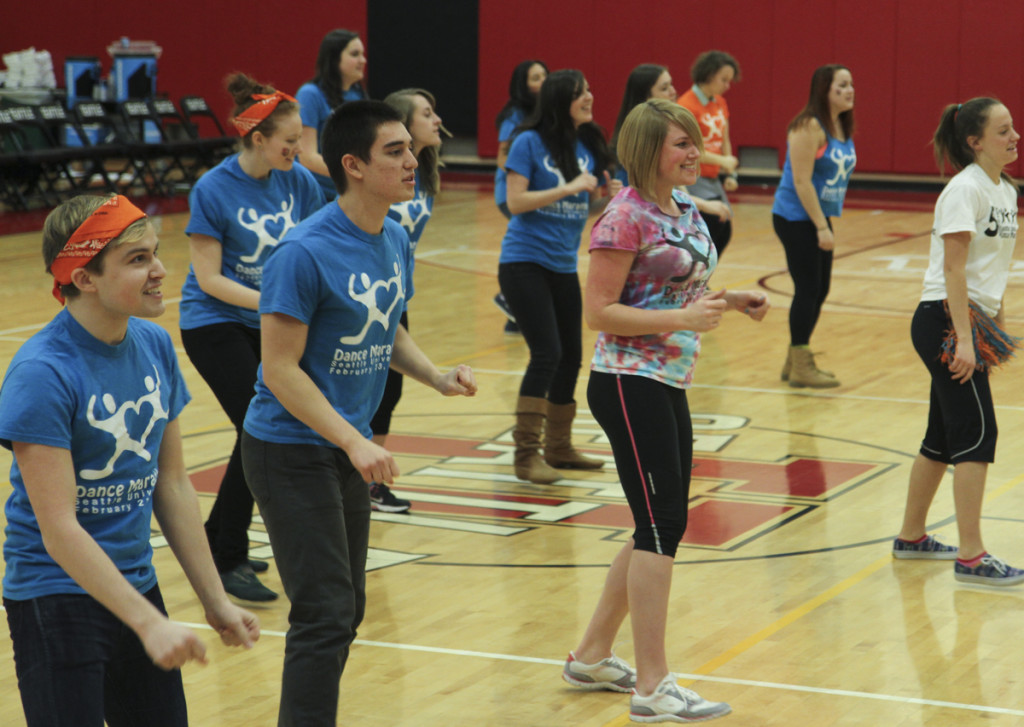Seattle University’s students are dancing to make a difference. Through Dance Marathon (SUDM), Seattle U is striving to save lives by fundraising for Seattle Children’s Hospital’s Uncompensated Care Fund.
SUDM hosts several fundraising events throughout the year, but is named after its annual signature event, Dance Marathon. During this event, participants actively participate for 16 hours straight to demonstrate support for patients who cannot take a break from their illnesses.
“We are emblematic of Seattle University’s social justice mission,” said Katy Granath, the external executive chair of SUDM.
Each year, dance marathons at schools across the country fundraise for their local Children’s Miracle Network hospitals.

Dance Marathon Moral Captains give a sneak peak of the traditional line dance that all participants in Dance Marathon will learn during the 16 hours of dancing. Dance Marathon is on Feb. 22 from 10 a.m. to 2 a.m.
“We’re the third largest Dance Marathon in terms of fundraising on the West Coast and the largest in the Pacific Northwest,” said Shane Price, who has been the overall executive chair of SUDM for the past two years.
So far this year, SUDM has risen over $32,000 for the Uncompensated Care Fund. Their pledged goal is $50,000.
The Uncompensated Care Fund provides free lifesaving health care to patients who cannot afford insurance or whose medical costs exceed the amount covered by their insurance.
SUDM began seven years ago as a small student-led organization, but has quickly transformed into a distinguished philanthropy group on campus.
“They have been growing by leaps and bounds and are doing such an amazing job,” said Melissa Cardenas, the development coordinator for Seattle Children’s Foundation and Guild Association. “I am more than confident they will raise over $50,000 this year.”
Cardenas is the Children’s Hospital adviser for SUDM’s student marathon leaders, who have been rapidly expanding the organization’s fundraising efforts.
In its first year SUDM raised $4,000; in its sixth year it raised over $43,000. In its first six years combined, SUDM has raised over $127,000.
“We started highlighting the mission more and we rebranded ourselves as a year-long fundraising group instead of just a once-per-year event,” Price said.
The group has used social media and marketing campaigns to gain visibility and hosted numerous events on campus.
“Dance Marathon is more than just one event; it’s a community,” Granath said.“We wanted to make sure that people were connected to that community throughout the year.”
And people are indeed connecting. The greater Seattle community has applauded SUDM’s commitment to social justice. Seattle Mayor Ed Murray will be giving a short speech at Seattle U’s Dance Marathon this year. Several Seattle Children’s patients will also attend the event.
“They’re called our miracle kids and our miracle families,” Granath said. “They work with us, they come to our events and speak, and they remind us why we’re doing this.”
Many of the people involved in SUDM have personal connections with Seattle Children’s and some have even been former patients there.
Price was diagnosed with Type 1 diabetes at Seattle Children’s and was also seen “for what I now know is a rare neuromuscular disease,” he said. “They worked tirelessly to figure it out—it took 11 years to diagnose.”
Price strives to give back to Seattle Children’s in support for their continuous care of children.
“They put in a lot of extra effort outside of the minimum that would be required for their job,” he said. “Everyone who is in there are all there because they care.”
Alex Stoffel, the dancer relations chair for SUDM, had a similar experience. At age six, she was diagnosed with a rare spinal cancer called Ewing’s sarcoma.
“After the surgery to remove the tumor, I was paralyzed from the waist down,” Stoffel said. She spent a year in the hospital receiving chemotherapy and radiation. “The doctors told my parents I had less than one percent chance to live even another year and zero percent chance of surviving past that.”
Stoffel and her parents continued fighting, and through a program similar to the Uncompensated Care Fund, she received funding for the medical care she needed in order to survive. She is now cancer-free.
“My procedures added up to around $100 million,” she said. “I’m giving back and giving thanks for a fund that helped save my life.”
Both Stoffel and Price will be sharing their stories at Dance Marathon.
“My main goal is changing the ‘us-and-them’ mentality that so many philanthropy groups and service groups have,” Price said. He hopes to show students that those who benefit from this fund are a part of our everyday communities.
Granath has experienced chronic illness in her own family and noted, “It’s not just the monetary costs, but the personal costs that are really high,” she said. “Dance Marathon is a way to be a community and come around a family or patient and let them know that they are not defined by their diagnosis, and regardless of the outcome they have a community around them who loves and supports them.”
This year Seattle U’s Dance Marathon is from Feb. 22 at 10 a.m. until Feb. 23 at 2 a.m.








